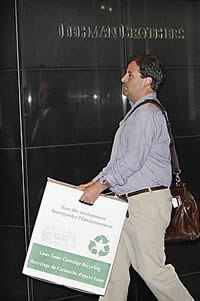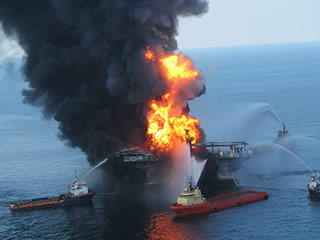Amos:
From Personal Piety to Social Justice
For Sunday July 18, 2010
Lectionary Readings (Revised Common Lectionary, Year C)
Amos 8:1–12 or Genesis 18:1–10
Psalm 52 or Psalm 15
Colossians 1:15–28
Luke 10:38–42
What do the war in Iraq, the collapse of the housing and financial markets in 2008, and the largest oil spill in history (May 2010) all have in common? They all illustrate the power of large institutions to do great harm. They demonstrate how governments can destroy civil society, how complex financial institutions can exploit and ruin the lives of everyday people, and how a multi-national corporation can despoil the environment in an unprecedented way.
In many Christian traditions the notion of "sin" has been reduced to the personal and the private. This partly explains our voyeuristic impulse when a person's faults are exposed to the public. We think of sin as the failure of a single individual's free will choices, or maybe a result of moral weakness. Sometimes we hear cradle Catholics joke about or lament their "guilt complex."
 |
Iraq war. |
We should never trivialize personal sin as some do when they joke about "the seven deadly sins." Consider for a moment how horribly personal greed corrupted the ruthless oil prospector Daniel Plainview in the film There Will Be Blood. The last few minutes of that film are very hard to watch. Nevertheless, although consideration of the personal and private is always necessary, by itself it's not sufficient.
The prophet Amos for this week broadens the concept of sin beyond the single individual to include corporate institutions. He shows that God cares not only about the private lives of individual people, but also about the moral actions of institutional systems. Personal piety is important to God, but social justice is perhaps even more so. Only large institutions with complex bureaucracies and vast resources — national governments, Wall Street banks, or British Petroleum — can slaughter millions, manipulate global markets, and ravage the planet while privatizing profits and socializing risks.
Amos wrote 2,800 years ago, but reading him feels like a blast of cold, clean air. He lived during the reign of the renowned king Jeroboam II, who reigned forty-one years (786–746 BC) and forged a political dynasty characterized by territorial expansion, aggressive militarism, and unprecedented national prosperity. The citizens of his day took patriotic pride in their religiosity, their history as God's favored people, their military conquests, their economic affluence, and their political security (4:5, 6:13, 9:10).
The first page of Amos shows how in the Bible "prophecy" is more about forth-telling God's word to contemporary society than about fore-telling the future. He starts off with a crowd-pleasing, foreign policy briefing that would have made his fellow citizens cheer and jeer. His affidavit charges Israel's enemies with horrific war crimes. Amos might have been a small town farmer, but he had a fertile imagination and a lethal pen.
Damascus "threshed Gilead with sledges of iron teeth." Gaza "took captive whole communities and sold them to Edom." Tyre sold their prisoners of war into slavery and flaunted international treaties. Edom "stifled all compassion" and pursued its enemies with "unchecked rage." Ammon "ripped open the pregnant women of Gilead in order to extend his borders." Moab "burned, as if to lime, the bones of Edom's king."
 |
Lehman Brothers collapse. |
Amos's audience would have smugly applauded his denunciation of these atrocities — mutilation, scorched earth campaigns, slavery, depopulation, ethnic cleansing, global treachery, torture, and flagrant degradation of your victims. They thought they were different, above such crimes against humanity.
But then Amos pivots from Israel's enemies to his own nation. And just like in the gospel for this week about the Good Samaritan, the self-righteous "insider" experiences a rude reversal. Israel had overplayed its hand. They misread the signs of the times. Convinced of the nobility of their own nation and of the inferiority of foreigners, they found it impossible to understand how others saw them. They considered their country superior in every way to the "axis of evil" that Amos had just denounced. Under Jeroboam, Israel developed an exaggerated sense of exceptionalism which they invoked to exempt themselves from universal standards that applied to their own nation as well as to their enemies.
Like the minority report of an alternative news source, Amos spoke to their national delusions. He was the classic outsider who preached from the unpatriotic fringe. He was blue collar rather than blue blooded. He was neither a prophet nor even the son of a prophet, but instead a farmer from little Tekoa, about twelve miles southeast of Jerusalem and five miles south of Bethlehem. The cultured elites of his day despised Amos as a redneck. He was also an unwelcome outsider. Born in the southern kingdom of Judah, God called him to thunder a prophetic word to the northern kingdom of Israel.
Amos's prophecy delivers a withering critique of Israel's entire culture. He describes how the rich trampled the poor. He says the affluent flaunted their expensive lotions, elaborate music, and vacation homes with beds of inlaid ivory. Fathers and sons abused the same temple prostitute. Corrupt judges sold justice to the highest bidder, predatory lenders exploited vulnerable families, and, on top of it all, religious leaders pronounced God's blessing on it all.
With Israel at the peak of its power, and having good reasons to believe that no disaster could befall it (9:10), Amos preached a counter-intuitive and culturally subversive message. To the country's disbelief, he said that Israel was no different than the pagan nations with their war crimes (9:7). Before God they were equals. He spoke to average citizens in general, but especially to the nation's leaders in particular — priests, judges, financiers, and state bureaucrats,"the notable men of the foremost nation" (6:1). In this week's reading Amos compared Israel to a basket of summer fruit that was not merely ripe but close to rotten (8:1).
I imagine that very few people listened to Amos. In a paroxysm of rage and in defense of Jeroboam, Amaziah the priest ran him out of town (7:7–17). Still, Amos announced the end of Israel's empire. That end came quickly, too. In 725 BC the Assyrian king Shalmaneser occupied Israel for three years, crushed the opposition holdouts, and then deported its population (2 Kings 17). In twenty-five years Israel went from being a regional power under Jeroboam II to a failed state under Shalmaneser.
 |
BP Deepwater Horizon rig burns. |
I recently bought Amnesty International's 2010 annual report on the state of the world's human rights. It "documents abuses in 159 countries and shows how powerful governments block advances in international justice by standing above the law on human rights, shield allies from criticism, and act only when politically convenient." The study also reports on progress made. In South America, for example, "several trials of previous heads of state for human rights violations took place under national legislation, and in Peru Former President Alberto Fujimori was sentenced to 25 years’ imprisonment for grave human rights violations in 1991."
The report details the responsibilities that institutional actors have in the areas of torture, freedom of expression, prisoners of conscience, unfair detention and trials, and discriminations of all sorts. The report reminded me of Amos's message to ancient Israel, that it's one thing when a single individual defrauds his neighbor, but quite another when a government exterminates an entire people or a multinational company destablizes global markets. God cares about the latter as well as the former.
For further reflection:
* Who might be today's "notable men of the foremost nation" (Amos 6:1)?
*
Contemplate Psalm 52:7 and the collusion of power, wealth, and violence from this week's reading: "He trusted in his great wealth / and grew strong by destroying others."
* Consider this week's epistle, that God not only created "all things," but that He intends to reconcile "all things" through "making peace" in Jesus (Colossians 1:15–28).
* For the 2010 Amnesty International Report see http://thereport.amnesty.org/
Image credits: (1) RadicalAvenue.com; (2) The Wall Street Journal; and (3) Treehugger.com.





